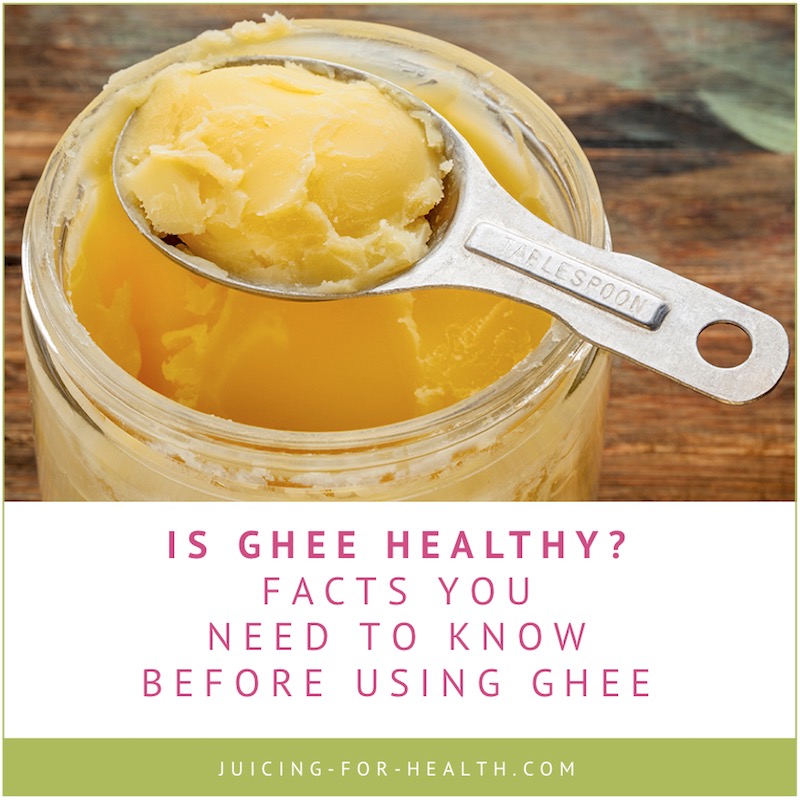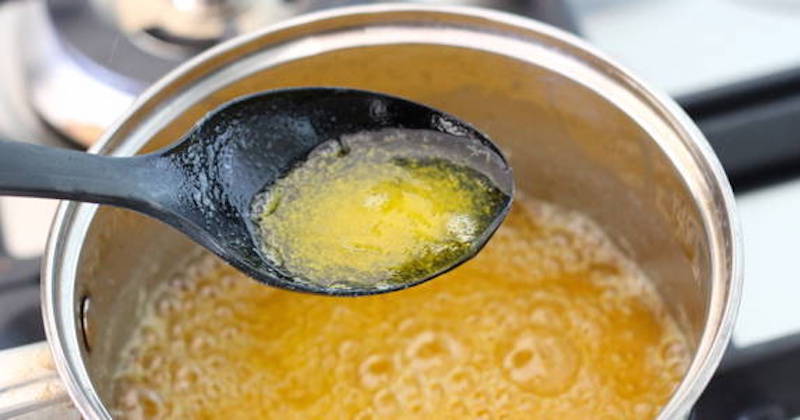Is Ghee Healthy? Facts You Need To Know Before Using
Last updated on
What Is Ghee?
Essentially, ghee is a type of clarified butter that is traditional to the Indian region—just like the Manteiga-da-terra (”butter of the land”) in Brazil, Niter kibbeh in Ethiopia, or Toplyonoe maslo in Russia.
All of these products have their own unique details in terms of cooking, but the goal is the same: to extract the water and milk solids (proteins and carbohydrates, mainly lactose) from the butterfat.
Long story short, ghee is a traditional Indian recipe of pure butterfat produced by melting butter and gently simmering it for 10-20 minutes to evaporate the water. As a result, part of the milk solids will form a foam on the liquid’s surface and the other part will sink to the bottom. When the solids on the bottom are golden brown, the liquid should be filtered (through cheesecloth, for example) to remove the milk solids. Voila, your ghee is ready!
What Does Ghee Taste Like?
Ghee has a unique fatty taste which most people describe as nutty, with light caramel undertones. This taste is the result of the milk solids getting somewhat caramelized during the preparation process, and its intensity will differ depending on how long the ghee had been simmered.
In any case, although ghee may taste ”buttery” (it’s prepared from butter, after all!), it’s really a one of a kind thing.
Differences Between Ghee And Butter
Physical Properties: In terms of physical properties, ghee has a much higher smoke point than butter, so it’s a healthier fat for cooking. Ghee also has a much longer shelf life compared to butter.
Nutrition: In terms of nutrition, ghee is virtually lactose-free and thus is suitable for people with lactose intolerance. It is free of milk proteins like casein, most of which are thought to be responsible for milk allergies. If you have an unstable immune system or are prone to allergies, ghee is a much better option for you than butter.
Shelf life: On average, ghee can be stored for about 3 months at room temperature and for 8 to 12 months in the fridge (butter lasts for about 6-9 months in the fridge).
Is Ghee Healthy?
Ghee produced from grass-fed butter is among the healthiest options of fat for everyday use. It has a fabulous taste, a very high smoke point, and numerous health benefits. Additionally, it’s clear from most things that people try to avoid in dairy—like lactose and casein.
High Smoke Point
The temperature at which an oil’s molecules begin to break down is known as the “smoke point”: going past this temperature puts you at risk of exposure to different carcinogens. In other words, the higher an oil’s smoke point is, the healthier and safer this oil is for cooking.
Ghee is among the best types of fat for frying since its smoke point is about 482 °F (250 °C). For comparison, here are the smoke points of other fats often used for cooking:
- Avocado cooking oil: 520 °F (270 °C)
- Ghee: 482 °F (250 °C)
- Coconut cooking oil: 428-446 °F (220-230 °C)
- Virgin olive oil: 410 °F (210 °C)
- Butter: 302 °F (150 °C)
Is Ghee Good Or Bad For Your Heart?
If consumed moderately, ghee is absolutely neutral for your heart. Studies indicate that you can safely replace up to 10% of your daily energy intake with ghee without compromising your blood cholesterol levels.
Some people fear that the amount of saturated fats (which is over 60%) in ghee could increase their cardiovascular risk, but this concern is outdated: recent studies clearly show that there is no strong association between one’s intake of saturated fat and increased risk of heart disease.
Nutritional Facts
According to the USDA food database, 100 g of ghee contains 900 kcal, all coming from fat. There are no proteins or carbohydrates in ghee.
About 62% of the fats in ghee are from the saturated group, 29% from the monounsaturated, 4% are polyunsaturated, and up to 4% of the fats may be from the trans-saturated group.
Ghee is rich in several fat-soluble vitamins. For instance, 100 g of ghee contains 3069 IU of vitamin A (61% of the Daily Value for adults) and about 15.7 mg of vitamin E (105% of the Daily Value for adults).
Health Benefits Of Ghee
Ghee soothes irritable bowel syndrome: Ghee is rich in butyric acid, and some studies indicate that this substance significantly improves bowel movement during IBS, calms down abdominal pain, and even relieves local inflammation.
Ghee is a rich source of conjugated linoleum acid (CLA):CLA is a fatty acid that was confirmed to have a beneficial effect on body weight, reduce inflammation, and even prevent some forms of cancer.
Ghee is rich in MCTs:Medium-chain triglycerides (MCTs) are healthy fats with numerous benefits. For instance, they have powerful anti-oxidative and anti-inflammatory properties, improve insulin sensitivity (thus helping to manage diabetes), and promote weight loss.
Ghee may improve digestion: Inflamed guts are unable to properly digest and absorb nutrients. Thanks to its high content of butyrate and MCTs, ghee can effectively soothe local inflammation and improve digestion.
Use Of Ghee With Restricted Diet
Is Ghee Suitable For Vegans?
Even though ghee does not contain any milk solids, it still contains animal fat and is produced from an animal product—butter. No matter how you look at it, ghee still derives from an animal, so it is NOT suitable for vegans.
Is Ghee Lactose-Free?
Lactose is the dominant carbohydrate in milk. During the preparation of ghee, both lactose and all other milk solids (galactose, casein, other milk proteins and carbohydrates) are separated from the fat, so ghee is virtually lactose-free. It may contain trace amounts of the substance, but this dose shouldn’t evoke a reaction in lactose-intolerant people.
Specifically, according to studies, 100 gram of ghee packs up to 2.9 mg of lactose while lactose-free whole milk contains up to 40 mg per 100 gram and lactose-free butter has about 1 mg of lactose per 100 gram.
How Do You Use Ghee?
- Due to its high smoking point, ghee is a great fat for frying and sauté
- Use it instead of butter or vegetable oil for cooking and baking.
- Ghee can be used as a healthy spread on bread and pastry. Some people even mix it with cocoa powder and honey to make a homemade Nutella substitute!
- Ghee is a popular ingredient in many traditional Indian dishes.
- A tablespoon of ghee can be taken daily as a vitamin supplement to ensure you’re getting enough of vitamins A and E.
- Use ghee in place of coconut oil to make a healthy ghee coffee creamer that enriches your morning cup of coffee. Get the recipe here.
What Can Ghee Be Used For Besides Cooking?
Besides cooking, there are quite a few unexpected ways in which you can use ghee in your life! Like coconut oil, it has many uses besides using it for cooking.
- A mix of ghee and raw honey makes an incredible dressing to heal wounds and burns, even infected ones.
- Ghee can be used as a natural moisturizer and strengthener for the hair and skin. It keeps your hair follicles healthy and skin radiant for longer than your chemical body lotion.
- Dab ghee on your cuticles and leave for about 10 to 20 minutes. The fatty acids in ghee will moisturize and soften your cuticles.
- Use ghee for oil pulling that works just as well as coconut oil. Ghee oil pulling helps whiten your teeth and keeps your gum healthy. Just put a tablespoon in your mouth and swish it for 15-20 minutes every day.
All in all, ghee is now considered the better cooking oil to use versus seed or vegetable cooking oils. Considering all the health benefits above, you may want to start including ghee in your healthy routine.
I like the fact that it has antioxidative and anti-inflammatory properties. If eating healthy is important to you, then ghee is definitely a good choice.
It is also pure milk fat cleared of the substances that may be harmful to some people—like lactose, for example.
Share with us your experience using ghee!
Some of the links I post on this site are affiliate links. If you go through them to make a purchase, I will earn a small commission (at no additional cost to you). However, note that I’m recommending these products because of their quality and that I have good experience using them, not because of the commission to be made.
Comments
Leave a Reply




































 JOIN OVER
JOIN OVER
Great info! I will need to research this more. Thanks!